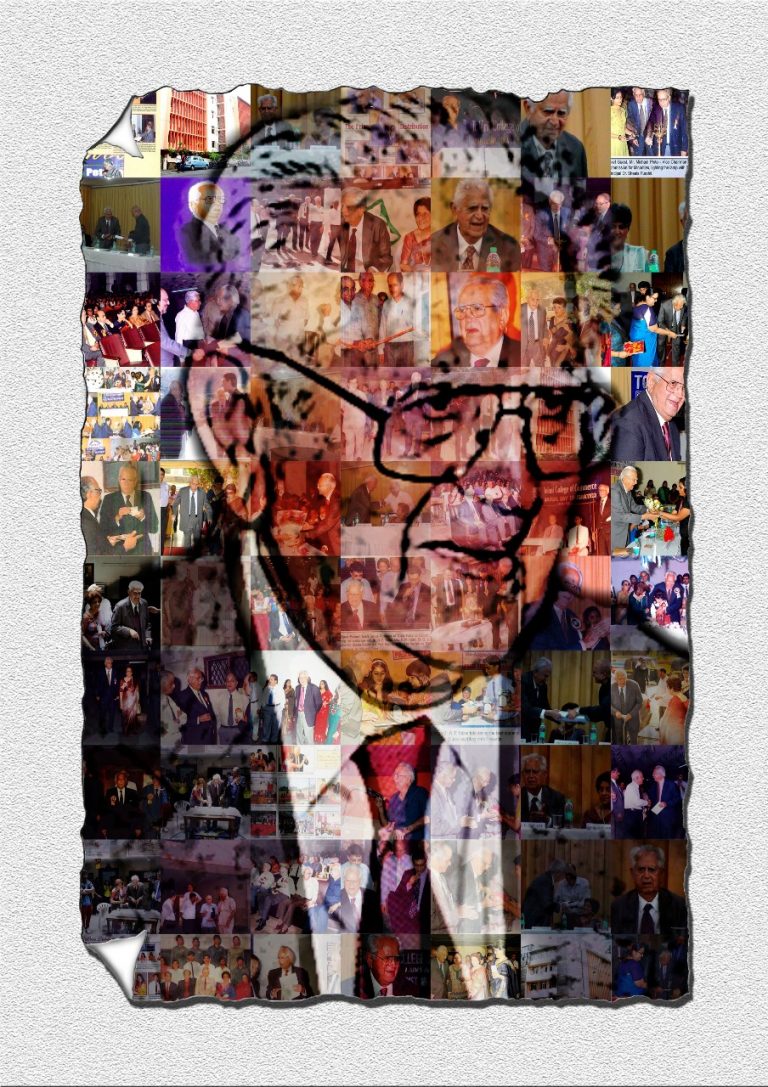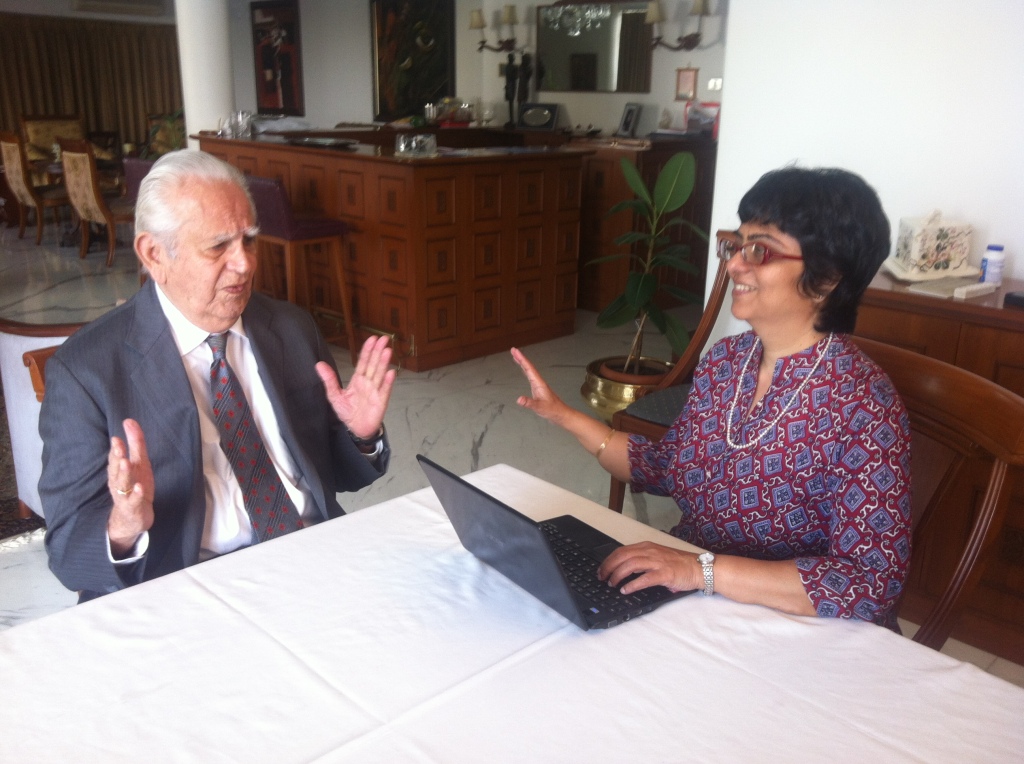
After a Bachelor’s Degree from the King George Institute of Agriculture, Sakrand Sindh, Nandlal left for Cornell University, USA but the situation had changed when he landed in Bombay in 1948 with a Master of Science degree in Agricultural Engineering
Nandlal and his team built more than twenty earthen dams in Maharashtra and Gujarat.
By Saaz Aggarwal
Dr. Nandlal Tolani would have been 97 years old today if he had not breathed his last on 14 August 2017. He was one of the most extraordinary people I have ever met and I consider myself very fortunate to have had the chance to work with him.
Nandlal was born in Sindh in 1924 into a family of wealth and social position. Through the hard work and intelligence of the previous generation, the family’s orchards had grown into an extensive landholding covering hundreds of thousands of acres. A princeling with a large estate he would inherit, Nandlal was also a brilliant student.
After a Bachelor’s Degree from the King George V Institute of Agriculture, Sakrand, the young Nandlal left for Cornell University, USA.
_______________________
The arrival of a ship from India must have been an attraction to Indian students in San Francisco, perhaps eager for news from home. A group of them were standing there and, among them, I was surprised to see the brother of someone we knew well in Larkana!
In those days, Dada Gopal was partner in a law firm where the senior partners were Qazi Fazlullah and Mohammed Hanif. In the 1950s, Qazi would be Chief Minister, and Hanif Legal Remembrancer, of Sindh. It was Hanif ’s younger brother whom I met by chance in San Francisco. It was he who taught me my first lesson about life in America. When we sat down to have coffee together, he laughed and told me, “Ok, here’s my five cents. Now you put down five cents. That’s how the Americans do it! Everybody pays for their own coffee.”
I must say I was amazed and later, when I saw this happening around me, was glad I had already been trained to do so. However, I never stopped feeling that this was not the proper way to do things and whenever I had a choice, preferred to follow the Sindhi habit of paying for others too. If I ever asked somebody, “Shall we go and have coffee”, and he said, “Yes,” to me it meant that he was accepting my invitation so I must pay for both of us.
_________________
Nandlal was on his way home with a Master of Science degree in Agricultural Engineering, equipped to take his place on the family lands, when the impact of Partition started making itself felt. By the time his ship docked in Bombay in early 1948, it was clear that things were changing radically, and Sindh would never be the same again.
Members of the family went to work immediately to support themselves. As per the First Five Year Plan of the new Government of India, the focus was on agriculture and Nandlal Tolani, with his Master of Science in Agricultural Engineering, took up a project to build an earthen dam in Kachch.
In 1950, he and his wife Papu moved to live in the wilderness, on project sites accessed through rough roads and at times with lions roaring just outside their bedroom. Over twelve years, Nandlal, his trusted lieutenant Kishin Chablani and their very capable team built more than twenty earthen dams in Maharashtra and Gujarat.
In Bombay, Kaka constructed a building for himself and his family and gradually built more to house other refugees from Sindh who needed comfortable homes. As the years passed, Nandlal’s involvement in the Bombay business grew.
Finding illogical government policies and corrupt government officials difficult to tolerate, Nandlal returned to Cornell to work towards a PhD. This time he had his family, his wife Papu and their young children Rohet and Sujata with him. It was a pleasant interlude, and he wrote his thesis in one year and ten months, a record that remains unbroken even today. His topic was how to develop an operational model to choose between a fertilizer plant and an irrigation project in underdeveloped countries. There were strong messages in this thesis for the Government of India, but sadly none were heeded.
Dr. Tolani enjoyed life at Cornell and would in later years say that he considered himself more fit for a life in academia than one in business. He would have stayed on to study and teach at Cornell but Kaka wanted him back at home and, the ever-loving and dutiful son, he returned to Bombay.
However, Dr. Tolani was determined to move away from construction. After considering many options in which business would be cleaner, he decided on shipping, which in the late 1960s was the Indian industry with the least corruption.
Starting with two ships – bought with the savings from his income and not loans – Tolani Shipping grew gradually and systematically. Dr. Tolani had no interest in becoming a great shipping tycoon and competing with other companies for the maximum number of ships. His aim was to create wealth and a comfortable life for himself, his family and his employees. While he achieved this, his company also grew to be highly regarded across the shipping world.

Dr. Tolani systematically divided his time and energy between his work, his philanthropic activities, his leisure pursuits and his family. He started a college of commerce in Andheri East, and grew it into a center where neighborhood children, at an impressionable age, would receive a high-quality and well-rounded education with a strong academic component, the best extra-curricular opportunities and a wholesome moral base. He endowed a chair at his alma mater Cornell University – the Nandlal P Tolani Senior Professorship in International Trade Policy. His lifetime dream was to found an institute in India which provided a quality of education comparable to the education he had received at Cornell, and to do this he developed the Tolani Maritime Institute entirely with his own personal funds: a college of maritime education set in a large and beautiful campus with extensive workshops, library and a campus ship for practical lessons. As he said:
I never wanted to profit from my educational institutes. What I did want was to run professionally-managed organizations. I wanted to do good business and have a healthy bottom line, but always within the ambit of the law. While doing so, I wanted others around me to benefit too. Working with my team, we built a reputation for being decent, principled, and reliable. Today my biggest satisfaction comes from the respect that every member of Tolani Shipping, of Tolani College of Commerce and of Tolani Maritime Institute command on the basis of this reputation
Dr. Tolani was never interested in wealth and power for the sake of wealth and power. The young Nandlal, a child who loved his grandmother dearly, had promised her that one day he would earn so much that she would have enough money to even fill up the toilet. When the time came that Dr. Tolani could have fitted gold taps in his bathrooms, he chose instead the vision and the discipline to use his wealth to truly live life to the fullest. He built a beautiful home, indulged his passion for luxury cars – not with a fleet, but one which he would drive himself and another for his family – and surrounded himself with good friends. He also shared his passion for bridge and sailing, sponsoring many tournaments that popularized these sports and supported many to participate in them. Sailing is an expensive sport, and more than half of those who enjoyed the sport through one of Bombay’s three sailing clubs during Dr Tolani’s time, were able to do so because of the subsidies he funded.
In his words:
To me, wealth has given security and some freedom of choice. I have been careful with my spending, and almost always chosen comfort over luxury.
I did use my wealth to indulge my love for bridge and sailing, and to try and attract others to these sports. These are sports that test our mettle, one mentally and the other physically. As such, they help us to engage and develop the faculties we are blessed with as human beings, and thus live life to the fullest. If there is one lesson of life that I would like to leave my grandchildren, it is the fact that money has little value. Personal satisfaction is far more important than money. For my grandchildren, and for those who come after them, I leave a wish that they may always understand the true priorities of their own lives, and that they may always have the discernment to judge right from wrong. I believe these are the things, rather than money, by which a life may be deemed successful.
[author title=”Saaz Aggarwal” image=”https://sindhcourier.com/wp-content/uploads/2021/06/Saaz-Aggarwal.jpg”]Saaz Aggarwal is an independent researcher, writer and artist based in Pune, India. Her body of writing includes biographies, translations, critical reviews and humour columns. Her books are in university libraries around the world, and much of her research contribution in the field of Sindh studies is easily accessible online.[/author]
Courtesy: Saaz Aggarwal – Sindh Stories